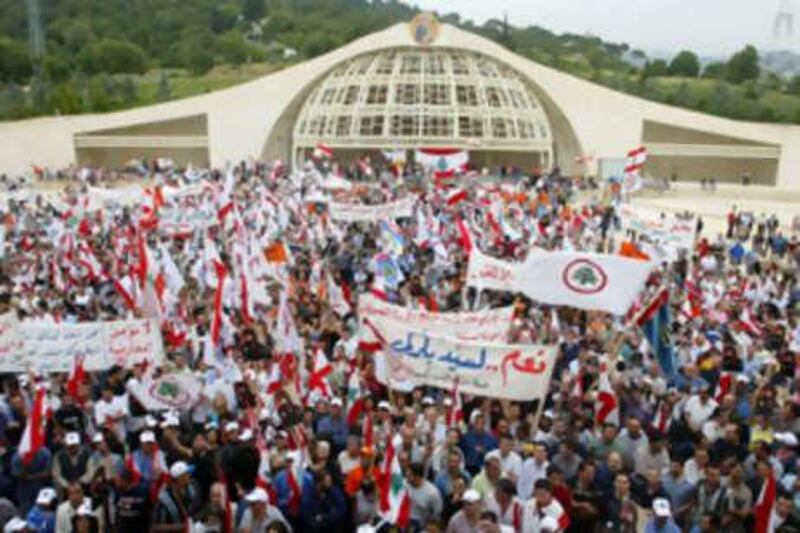BEIRUT // In a vote that continues the national reconciliation process begun after a series of clashes in May, the Lebanese parliament late on Monday approved an election law to allow parliamentary and municipal elections in 2009. The election of a new parliament and government was a critical part of the peace deal hammered out between the pro-western government and the Hizbollah-led opposition in May after a series of clashes killed dozens in street fighting throughout Lebanon. A coalition of Sunni, Christians and Druze parties composes the current government, which has been at loggerheads with the Shiite-dominated opposition in a political battle for veto power over government decisions that pushed this tiny nation to the brink of a sectarian collapse. Adopting an election law to schedule new elections was the final component of a peace deal designed by the Arab League during a May summit in Doha that also elected Michel Suleiman as president after months of a power vacuum following Emile Lahoud's departure from office in November. Other key steps included acquiescing to Hizbollah's demand that a national unity cabinet be established to allow opposition vetoes of policy and the establishment of a national unity dialogue to end tensions. Lebanon's Byzantine election system - which allocates seats in parliament according to a complicated religious and ethnic dynamic - requires approval of a law to dictate the terms of the election, a process that has been widely criticised for vulnerability to manipulation by the parties as they fight for control of the country. In the new law, which calls for all elections to be held on one day - rather than over a month as in the 2005 parliamentary elections - offers a major concession to the opposition, which had demanded creating smaller voting districts, which they believe will increase Shiite representation. Defeated were measures to allow expatriate Lebanese to vote from abroad - as many as 12 million Lebanese citizens live overseas - and one to lower the voting age to 18 from 21. Both measures were thought to benefit the current government, leading a key Christian party to vow to broach the subject again in follow-up legislation. "The new electoral law could be better [and] we are not satisfied," said Antoun Zahra, who represents the Lebanese Forces party in parliament. "We were trying to pass this new initiative to be part of the law which is the right for Lebanese abroad to vote from the country they are in through the Lebanese embassies. But I can say it's only fair this time for every one, just this time." The law does allow expatriate Lebanese to vote in elections scheduled for 2013. The new law, which was based on one used in the 1960 elections, will also limit candidate spending on campaigns and limit media coverage in the final days of the races. Under the new rules, stations will be required to offer equal time to candidates in Lebanon's highly politicised media community. It also bars last-minute opinion polling out of concern that polls could suppress voter turnout. But for a seemingly procedural vote, the adoption of the new law added a new level of stability to Lebanon's increasingly fractious political scene, even just a day after a bomb targeting army troops killed six people in Tripoli. In Tripoli, Rifaat Eid, a pro-opposition leader of the Allawite sect, whose followers have fought repeatedly with pro-government supporters this summer, said the law was probably unfair but necessary to calm down violence and political rhetoric. More than 20 people have died in clashes in Tripoli this summer. "It's not what Lebanese people are looking for, but what can we do?" Mr Eid said. "Let us pass this coming four years in peace among us and then we should start working on a new electoral law that suits everyone." * The National
Lebanon election law bolsters peace plan
The Lebanese parliament adopts a new electoral law aimed at paving the way for next year's legislative polls.

Editor's picks
More from the national




